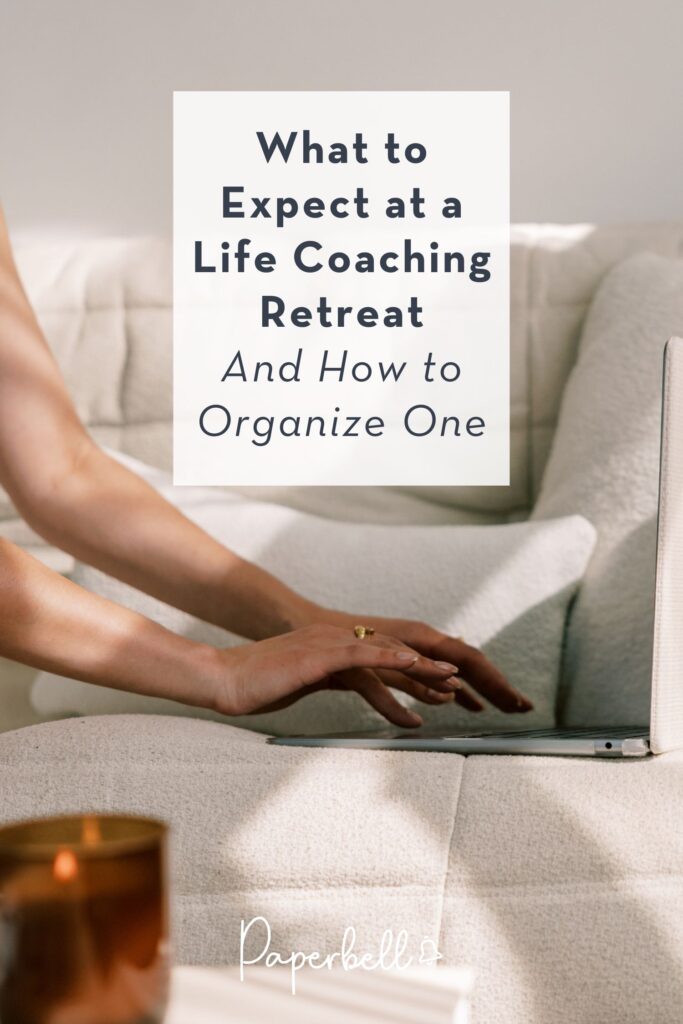When was the last time you turned off your phone and disappeared in nature to focus fully on your life vision, self-discovery, and goals?
Even if personal growth is a part of your daily routine, stepping away once in a while can bring you a change of rhythm that habitual reflection and ongoing coaching can’t.
This is why life coaching retreats have been becoming so popular.
These uniquely curated events offer a dedicated space to reflect, resolve, reset, and return to your life with renewed clarity and inspiration. They are the perfect combination of an active holiday and a transformative coaching experience.
Let’s explore what these retreats look like, which ones are worth investing in, and how you may organize your own.
What Is a Life Coaching Retreat?
Life coaching retreats are immersive events that combine group sessions in a supportive environment with wellness or leisure activities.
They generally involve several days of structured coaching exercises (like reflection prompts, models, visualization, and sharing circles) and creative or healing practices (such as meditation, yoga, breathwork, and nature walks).
Besides facilitated sessions, it’s the shared meals and conversations with like-minded people that make these events so memorable. Most of them are organized in nature-filled locations away from the hustle and bustle, adding a beautiful backdrop to moments of shared growth.
My Personal Experience With Life Coaching Retreats
It’s been a decade since I’ve been “doing the work,” committing to continuous growth and living consciously. Amongst the various forms of coaching, therapy, and healing practices I tried, there were a few retreats too.
The first time I experienced a coaching retreat was in the rainforests of Malaysia in 2017. Four days off-the-grid in a beautiful hillside resort with forty other people, redefining our values and envisioning our future through the Lifebook framework.
We spent our days learning about the framework, free writing, and sharing our insights in facilitated circles. We spent our evenings enjoying deliciously healthy meals and conversations on the open-air terrace or in the pool.

Photo credits: All is Amazing, shot at Mindvalley’s first out-of-office Lifebook team retreat
I left that long weekend with a completely new understanding of what matters to me and how I want to specifically design the various aspects of my life. Everyone in the office asked us what happened over the weekend that gave those of us who attended that distinctive glow.
Since then, I’ve been to a Circle Way methodology-based retreat in Bali, an art therapy camp in a tiny village in Hungary, and a few other curated getaways. They became some of my most memorable experiences.
Retreats can be magical in a way that conferences and local events can’t match. It’s all a matter of choosing a space and community that speaks to you at the time (which can, naturally, change) and taking time to step away from your daily normal.
Types of Retreats You Can Check Out
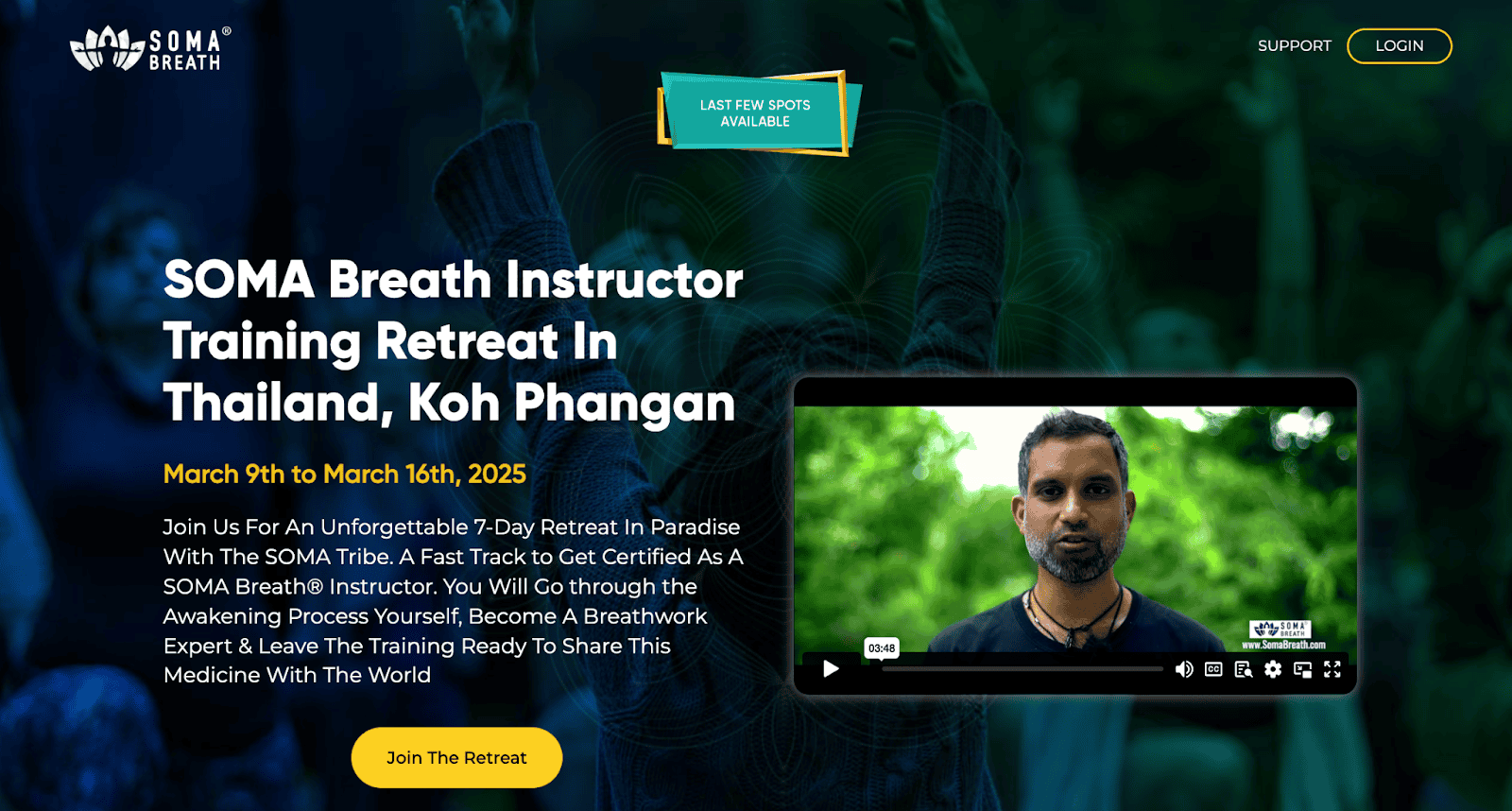
With thousands of retreats shared on directories and online groups, you can absolutely find one that fits your needs. Here are just a few formats that have been popular in the coaching space.
- Art therapy retreats: Coaching experiences designed to unlock creative potential through writing, painting, and other mediums.
- Adventurous retreats: Incorporating experiential activities such as fire walking or ice baths, like Wim Hof’s retreats.
- Holistic health retreats: Blending health coaching with movement, nutrition, and other practices for optimal well-being and longevity.
- Spiritual and mindfulness retreats: Focusing on meditation, energy healing, or breathwork, like SOMA Breath retreats.
- Luxury retreats: High-end experiences with five-star accommodations, gourmet meals, and exclusive activities, like Mindvalley’s A-Fest.
How to Pick the Right Retreat
Instead of impulse-booking the next hot thing (or that, you do you!), think about what you need the most right now.
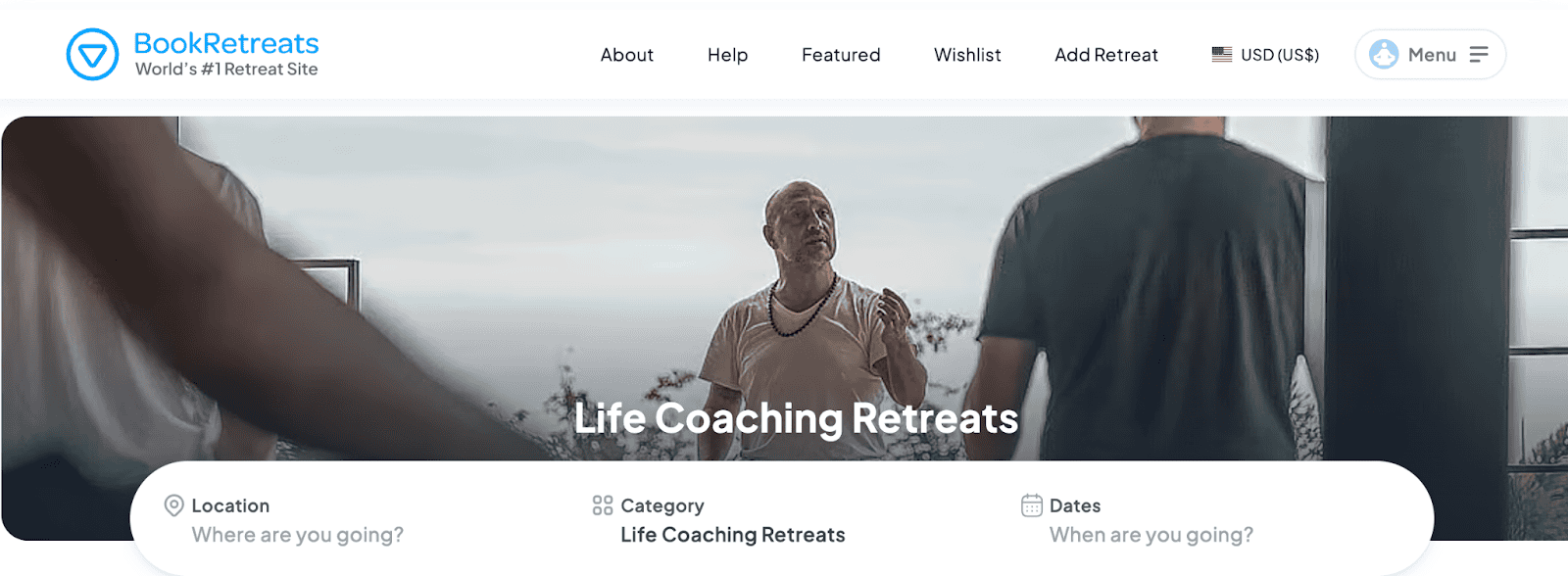
Have you been stuck in a rut? Are you curious about a particular methodology? Do you need a safe space to express yourself and listen to the collective wisdom of a group with similar values?
With that intention in mind, you can narrow down your research in the following ways:
- Filter events in directories: Beyond the basics, platforms like bookretreats.com let you find retreats that are alcohol-free, set in a desert, or host people over 60.
- Dig through your network: Follow coaches and communities in your region you resonate with or attend a few of their local events for a vibe check.
- Read the program: Check the detailed daily agenda with scheduled sessions and free-time activities.
- Compare costs: Pricier retreats usually offer better quality accommodation and food or a distinct methodology. However, some might just be overpriced.
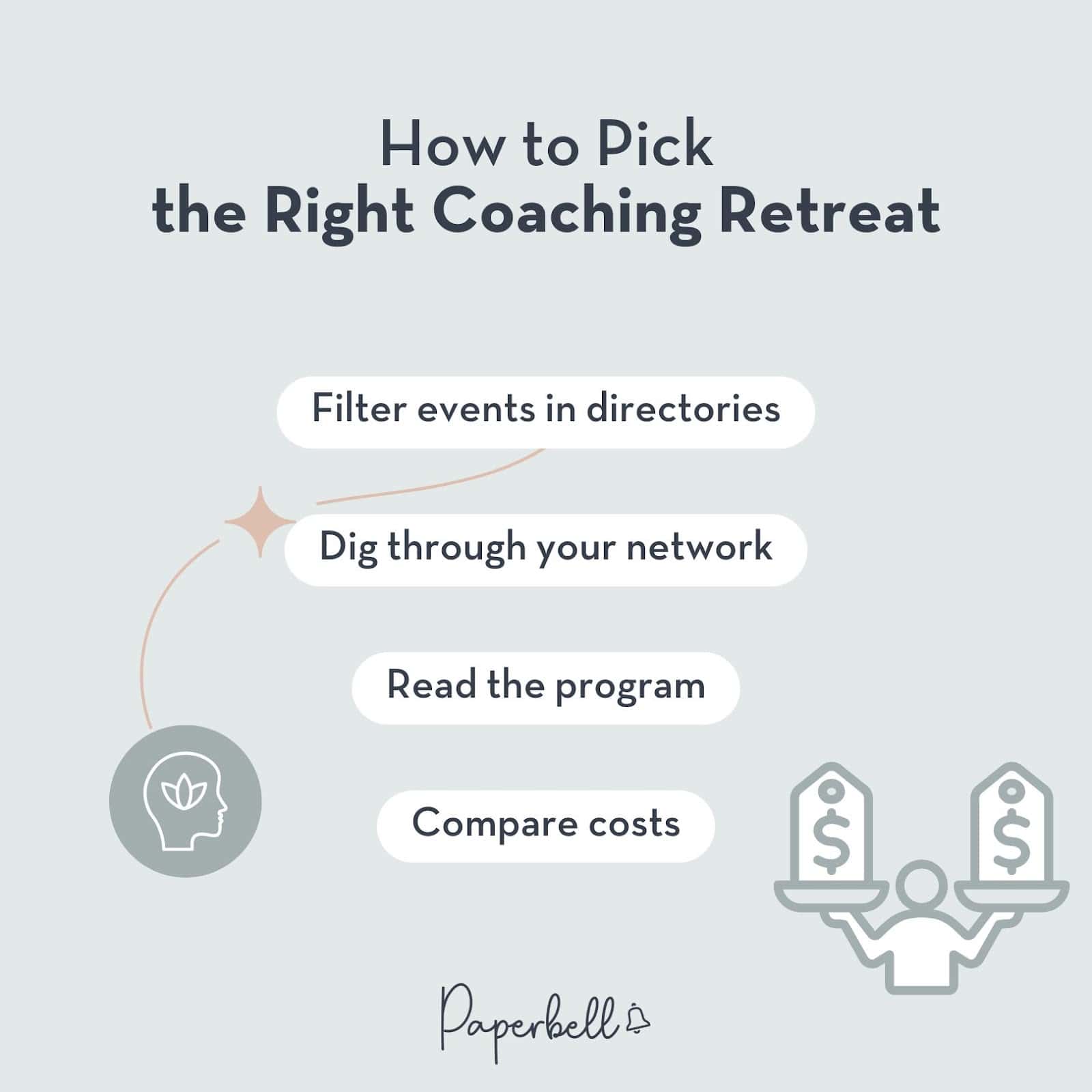
Red Flags to Look Out for
With everyone and their mother organizing retreats in the coaching space, there are inevitably some bad apples. Try to avoid events that:
- Promise exaggerated claims, especially without a clear schedule or activities.
- Has negative reviews or none, apart from some polished testimonials on their website.
- Are organized in locations with safety concerns or involve risky activities without expert facilitation.
- Has no transparent pricing or pressures you into immediate payment and upsells.
- Don’t respond to your inquiries.
The safest bet is getting to know the organizers beforehand, checking independent feedback from past participants, and getting clear on logistics before signing up. If an event sounds too good to be true, it probably is.
Hosting Your Own Coaching Retreat
If you’re a life coach, organizing a retreat can be a great way to diversify your packages and provide an immersive, high-ticket experience to old and new clients. Here are a few things to remember when setting up your event.
Defining Your Target Audience
Your retreat may not be for all your clients, but it may open doors to a demographic you’ve never worked with before. Understanding who will attend your event will shape everything, from your agenda to the location.
The more you define whom your event is for, such as women over 50 who want to rediscover their purpose, the more you can tailor it to their needs. This will also strengthen the community aspect of your retreat and let you prioritize the coaching tools attendees can benefit from the most.
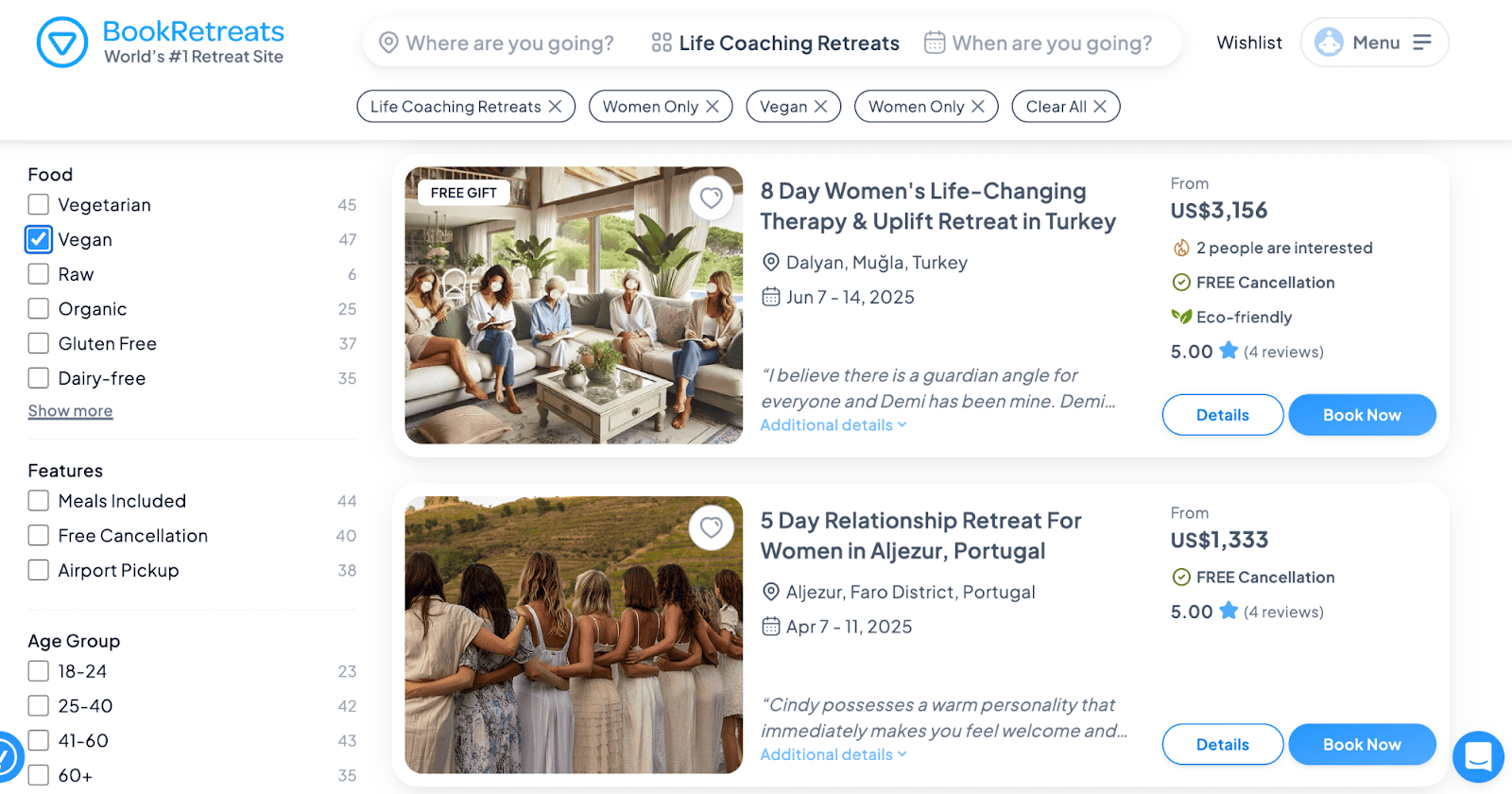
Cost will be an important factor for most people, so think about whether your target participants will expect a luxury experience or something more affordable.
Program and Facilitation
Retreats usually balance group sessions and exercises with reflection time and leisure activities. You should ideally maximize the value of the event without overwhelming participants. Here are some sessions you may consider for your agenda:
- Opening session: Welcome your participants and lay down a few ground rules so everyone can enjoy the experience. Introductions and intention-setting can bring them closer together and set the tone for the rest of the retreat.
- Thematic sessions: Design a series of sessions with various interactive and reflective exercises built around the theme of the event. Make sure you allocate enough time for and schedule short breaks between each.
- Leisure time: Include optional yoga classes, nature walks, or meditations before or after the main sessions of the day. These can help participants stay grounded.
- Free time: Give attendees plenty of space to connect and relax during mealtime or after dinner. You may also include an excursion for the last afternoon to a nearby beach or sight.
- Closing session: Encourage participants to share their key takeaways and set intentions for changes they want to make in their lives after they return home.
Hiring an event coordinator, other facilitators, or a co-host can help make the program go smoothly.
Some participants may experience intense emotions during sessions and you’ll need to hold space for them. You may also need to handle unexpected weather changes, transportation delays, or conflicts, even at small, local retreats.
Make sure you have a co-host or team you trust to support the event with professionalism and bring the right energy to it.
Picking the Right Location
The setting of the retreat will greatly impact the experience. It needs to accommodate the maximum number of participants you’re planning with (in private or shared rooms, according to preference) as well as any special needs like wheelchair accessibility or dietary choices.
A secluded mountain lodge or beachside resort in a stunning location can elevate the experience but come at a higher price. You’ll also need to consider whether those interested can get visas and travel to the retreat location easily.
If you’re planning a high-end experience, you can raise the bar by inviting wellness practitioners or an on-site chef for your event.
Selling Tickets
Structure a package and pricing plan for your retreat that describes its value clearly.
Create a website or landing page that describes the location, amenities, program, activities, and team behind the event. Include testimonials from past events or coaching programs you’ve facilitated.
Paperbell provides an easy way to set up a custom landing page for your event, with secure payment, bookings, and digital contract signing linked to it. It can also automate your welcome emails and give attendees access to event materials through their dedicated client portal.
Your existing client pool or coaching community is a great place to announce the event first before opening it up to cold leads. Start promoting your retreat 3-6 months before the date through consistent social media posts, scheduled ads, and partnerships with relevant networks.
If you’re not ready to host a multi-day retreat, you can start with VIP days—private coaching intensives designed for rapid breakthroughs.
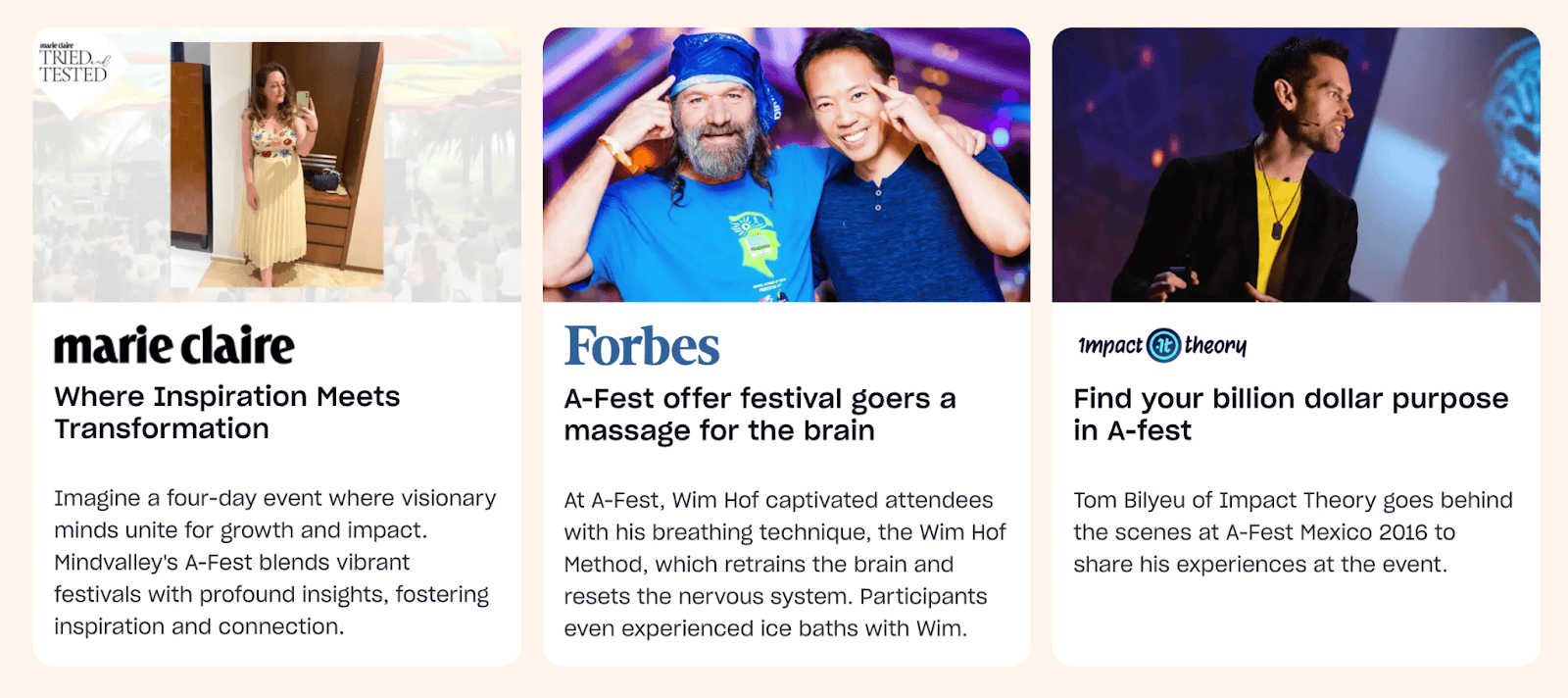
Documenting the Event
Setting up and delivering events has a lot of moving parts and documenting them often gets overlooked.
Get quality photography and videos done by a professional on-site to capture meaningful moments. Drone shots can capture the aesthetic of the location and give a more exclusive feel to the event.
You can use these visuals as branding and marketing assets in the future and share them with participants—who will, hopefully, do the same. Remember to get their consent or include a clause about image rights in your event contract.
Remember to collect written or video testimonials from attendees (you can shoot this on the last day of the event) and get written feedback from them a few days after about possible improvements.
FAQ
How Much Do Retreats Cost?
Prices vary widely, from $300 for budget retreats to $10,000+ for luxury experiences, depending on location, duration, amenities, activities, and the organizers.
Are Retreats Worth It?
Yes, if they align with your needs. The right retreats can offer safe spaces for reflection, growth, and connection.
How to Pick a Location for a Life Coaching Retreat?
Consider accessibility, atmosphere (beach, mountains, city), amenities, and seasonality to match the preferences of your participants.
When to Offer a Life Coaching Retreat?
Ideal timing depends on your audience—seasonal changes, holidays, or when your coaching clients seek deeper transformation.
Take Your Coaching Business to the Next Level
Life coaching retreats can create a lasting impact on your clients’ lives and allow them to share meaningful experiences.
Ready to sell tickets? Paperbell creates custom landing pages for your events and coaching packages that are automatically hooked up with a secure payment and booking system.
Attendees will be sent your contract to sign digitally, get your automated welcome emails, as well as access to all event materials through their client portal.
Try Paperbell for free and see how it can transform your coaching practice.
